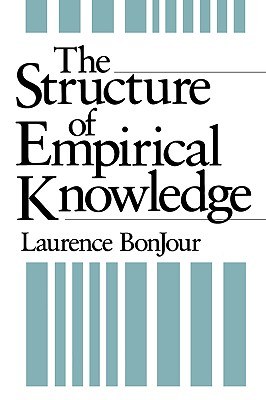The Structure of Empirical Knowledge
Douban
Laurence BonJour
visão geral
How must our knowledge be systematically organized in order to justify our beliefs? There are two options--the solid securing of the ancient foundationalist pyramid or the risky adventure of the new coherentist raft. For the foundationalist like Descartes each piece of knowledge can be stacked to build a pyramid. Not so, argues Laurence BonJour. What looks like a pyramid is in fact a dead end, a blind alley. Better by far to choose the raft.
Here BonJour sets out the most extensive antifoundationalist argument yet developed. The first part of the book offers a systematic exposition of foundationalist views and formulates a general argument to show that no variety of foundationalism provides an acceptable account of empirical justification. In the second part he explores a coherence theory of empirical knowledge and argues that a defensible theory must incorporate an adequate conception of observation. The book concludes with an account of the correspondence theory of empirical truth and an argument that systems of empirical belief which satisfy the coherentist standard of justification are also likely to be true.
contents
Preface
---
PART ONE: A Critique of Empirical Foundationalism
1. Knowledge and Justification 3
The traditional conception of knowledge 3
The concept of epistemic justification 5
The epistemological task 8
2. Foundationalism: The Main Conception
The epistemic regress problem 17
The varieties of foundationalism 26
A basic problem for foundationalism 30
3. Externalist Versions of Foundationalism 34
The basic idea of externalism 34
Some counter-examples to Armstrong's view 37
A basic objection to externalism 41
Some externalist rejoinders 46
Arguments in favor of externalism 52
4. The Doctrine of the Empirically Given 58
The idea of the given 58
Schlick on the foundation of knowledge 61
Quinton's conception of empirical intuition 65
Lewis on the given 72
An appeal to the a priori 79
---
PART TWO : Toward a Coherence Theory of Empirical Knowledge
5. The Elements of Coherentism 87
The very idea of a coherence theory 87
Linear versus nonlinear justification 89
The concept of coherence 93
The Doxastic Presumption 101
The standard objections 106
6. Coherence and Observation 111
An initial objection 112
A suggestion from Sellars 114
Coherentist observation: an example 117
The justification of the premises 124
Introspection 132
7· Answers to Objections 139
Answers to standard objections (I) and (II) 139
Some further objections 146
A restatement of the coherentist account 153
8. Coherence and Truth 157
The problem: justification and truth 157
Realism and the correspondence theory of truth 159
The metajustificatory argument 169
Skeptical hypotheses 179
---
APPENDIX A. A Priori Justification 191
The concept of the a priori 191
Is there a priori knowledge? 194
Is there synthetic a priori knowledge? 197
The idea of a priori intuition 207
APPENDIX B. A Survey of Coherence Theories 212
The positivists 212
Idealism: Blanshard 214
Lehrer's subjectivistic coherence theory 217
Rescher's pragmatic coherence theory 222
---
Notes 230
Bibliography 251
Index 255